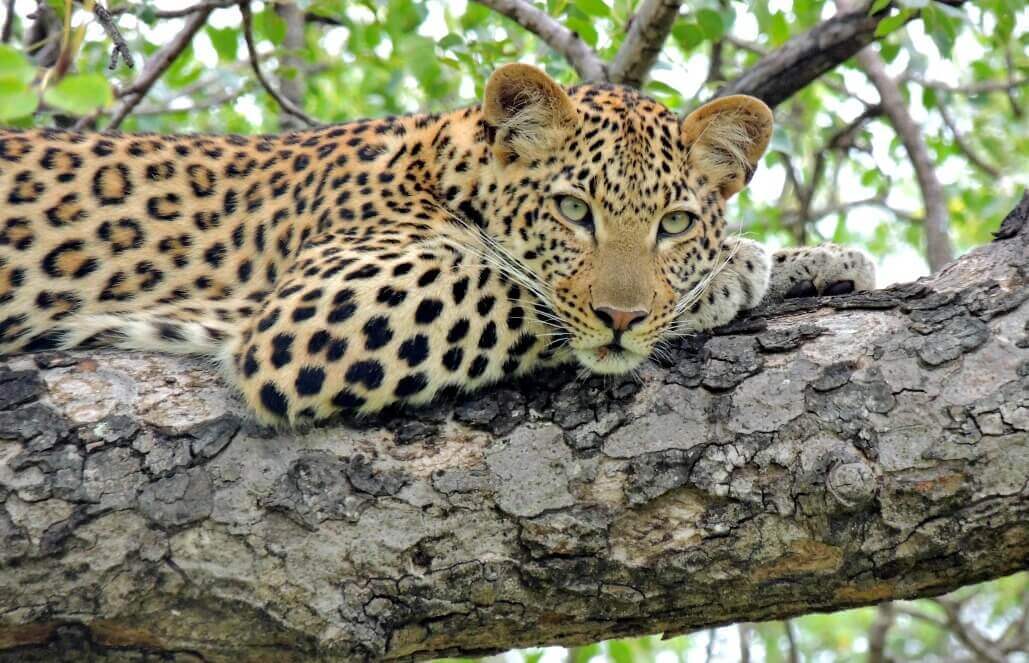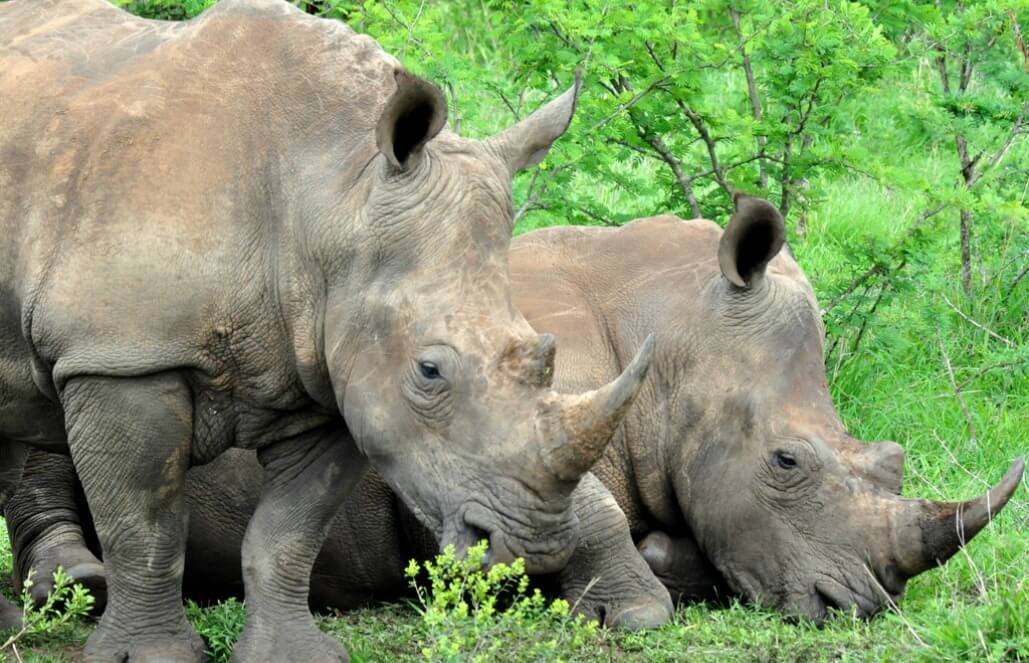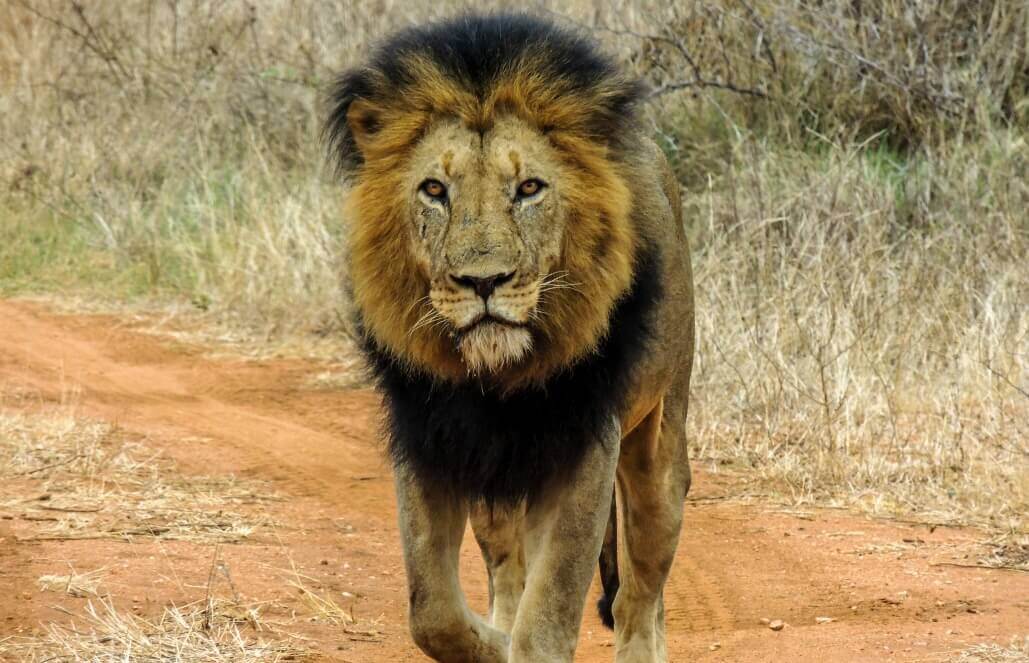So, what are the Big Five and how did these animals come to be revered above the rest?
Introducing the Big Five

Big Five refers to African lions, leopards, rhinoceros, elephants, and Cape buffalo.
The phrase today is usually used to market safaris, but was first coined by big-game hunters more than 100 years ago. In the nineteenth and early twentieth centuries, everyone from European royalty to American presidents wanted to bag an African hunting trophy. The larger and more unpredictable the beast, the better – which is how the Big Five became famous.
The Big Five may be dangerous, but they aren’t invincible. African lions, leopards, and elephants are all classed as Vulnerable by the International Union for the Conservation of Nature. The black rhinoceros is Critically Endangered and the Southern white rhino is Near Threatened, while the Northern white rhino is on the verge of extinction. The Cape buffalo is of the least concern in terms of conservation, but this also makes it the most popular animal to hunt. Hunting, poaching, and habitat loss combined mean the Cape buffalo’s population is also on the decline.
Where can you find the Big Five?
South Africa is a premier destination for viewing the Big Five.
Around 80 percent of Africa’s remaining wild rhino population live in South Africa, according to CITES, along with an elephant population of approximately 12,000 – a major recovery from a mere 120 in 1920. There are roughly 20,000 lions left in South Africa (down from 200,000 at the turn of the twentieth century), while leopard numbers are estimated at around 4,500.
Tourists have a good chance of seeing the Big Five in many of South Africa’s national parks and private reserves. To get a closer look and better understanding of the Big Five, a volunteer program is a great alternative to a safari. Volunteering in a wildlife reserve in the Kruger Area will give you plenty of opportunities to observe the animals in their natural habitat. No safari tour can compare to monitoring the behavior of elephants and rhinos alongside an expert conservation team!

The Big Five then and now: How has game hunting changed since colonial times?
There is still an active trade in legal hunting in Africa. South Africa is the biggest game hunting destination in the world. This practice however has undergone significant changes in implementation and public perception over the last century.
Four of the Big Five can be hunted in South Africa – the Department of Environmental Affairs (DEA) banned leopard hunting in 2016. A lioness is typically the cheapest of the ‘set’ to bag, costing around $9,000 to hunt, while a white rhino can cost more than $125,000, says a report by the Natural Resources Committee.
Back in colonial times, big game hunting had connotations of aristocracy and glamour. Today, game hunting still belongs to the elite and privileged, thanks to the hefty price tags, but for the most part associations of prestige and sportsmanship have been stripped away. Outside of hunting cliques, public opinion leans towards disgust over the killing of the Big Five.
Given the widespread disapproval and population perils facing the Big Five, game hunters have shifted the way they present the practice. Supporters insist that hunting is helping to protect, rather than destroy, the animals.
The Influence of Big Five game hunting on South Africa’s economy and conservation
Remember Cecil the lion? This big cat’s death and subsequent photo of a dentist gloating over his body triggered outrage around the world and deeper examination of big game hunting in Africa. Arguments surrounding modern game hunting are heavily polarized.
Defenders of game hunting say it can aid conservation efforts by generating revenue necessary to protect animals and their habitat – in many areas, land would be used for agriculture if it wasn’t for commercial hunting. Hunters also argue that they are helping to control animal populations and support local communities by providing jobs and income. This in turn could motivate people to protect animals from poaching.
Critics argue that minimal profits reach local communities, and that whether or not hunting supports conservation relies on the appropriate management of funds raised and sustainable allocation of animal quotas. Inadequate monitoring makes these factors difficult to control.
Either way, trophy hunting is big business in South Africa. According to Africa Check, around 8,500 trophy hunters visit South Africa each year, compared to 9.5 million tourists. These hunters spend more than the average tourist, averaging around $10,000 per hunting trip. Trophy hunting generates an estimated $100 million a year, says South Africa’s DEA.
Game hunting might help conservation when managed appropriately, but there are ways to help the Big Five that are much more appealing to animal lovers.

What can you do to help preserve the Big Five?
Wildlife lovers can assist in conservation efforts, either as tourists or volunteers. Tourists who come to shoot the Big Five with a camera lens rather than a weapon play an important role in conservation. The safari industry generates income to protect parks and reserves, provides jobs for locals, and incentivizes wildlife conservation.
Volunteering with animals in South Africa is an even more direct way for you to help in thier conservation.
Wildlife conservation centers and safari reserves act as hubs for education, provide refuge for orphaned and injured creatures and facilitate breeding programs to ensure the future of the Big Five. Volunteer program fees at these centers contribute toward running costs, and volunteers themselves return home as ambassadors for animal conservation.
Sound good? We might have just the ticket for you.
GoEco’s Big Five Volunteer Programs
GoEco offers several options for animal lovers keen to enounter the Big Five in an ethical and sustainable way. You can choose to carry out research on elephants, contribute to wildlife conservation efforts by adding your own snaps to a photographic database, or geo-track elusive species. Each project is structured around learning more about and protecting Africa’s unique and beautiful animals. Volunteering in South Africa is a great opportunity for personal and professional growth. You’ll develop practical skills and gain comprehensive wildlife knowledge, all while living in some of the continent’s most stunning wilderness areas.
If you’re feeling the call of the wildlife and want to get directly involved in Big Five conservation, reach out to us today to find out more about volunteering with South African animals.

Sources:
https://www.cites.org/sites/default/files/eng/cop/11/prop/20.pdf
https://www.panthera.org/cat/lion
https://africacheck.org/factsheets/factsheet-how-much-does-hunting-contribute-to-african-economies/
http://iopscience.iop.org/article/10.1088/1748-9326/aa854b/pdf
https://www.savetherhino.org/rhino_info/rhino_population_figures
https://conservationaction.co.za/resources/reports/effects-trophy-hunting-five-africas-iconic-wild-animal-populations-six-countries-analysis/
https://www.nytimes.com/interactive/2015/08/10/world/africa/africa-big-game-hunting.html
https://conservationaction.co.za/resources/reports/effects-trophy-hunting-five-africas-iconic-wild-animal-populations-six-countries-analysis/
https://www.thedodo.com/does-hunting-help-conservation-1389284014.html
https://en.wikipedia.org/wiki/Big_five_game
https://businesstech.co.za/news/lifestyle/127055/how-much-it-costs-to-hunt-the-big-five-in-south-africa/
https://www.reuters.com/article/us-safrica-leopards/big-5-off-the-cards-as-south-africa-closes-2016-leopard-hunting-season-idUSKCN0WF07C













 More Info
More Info